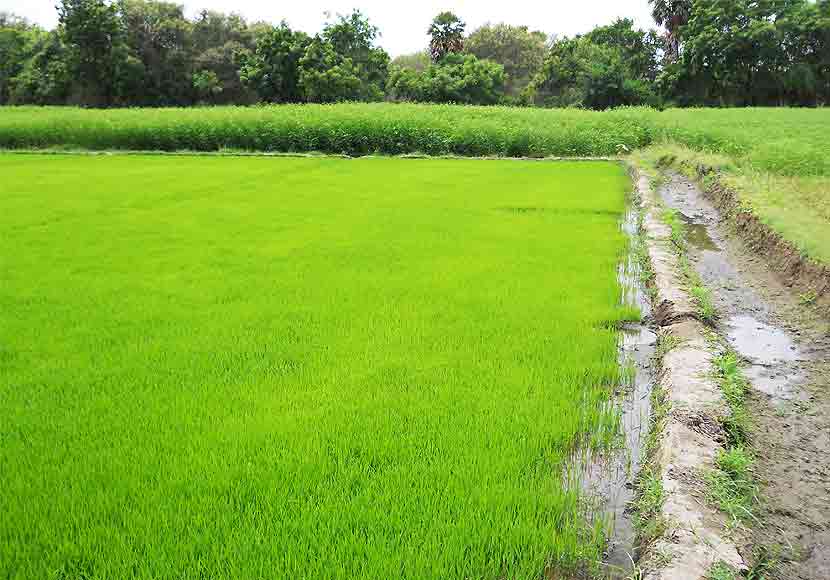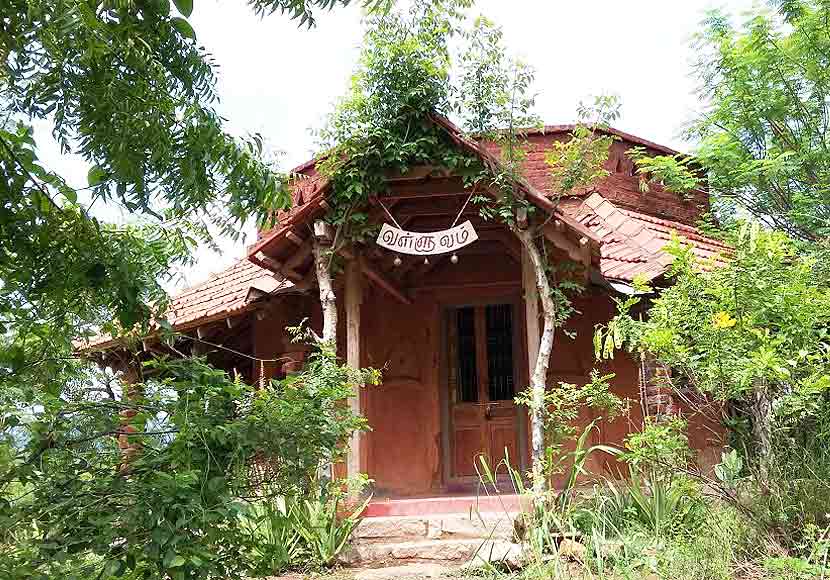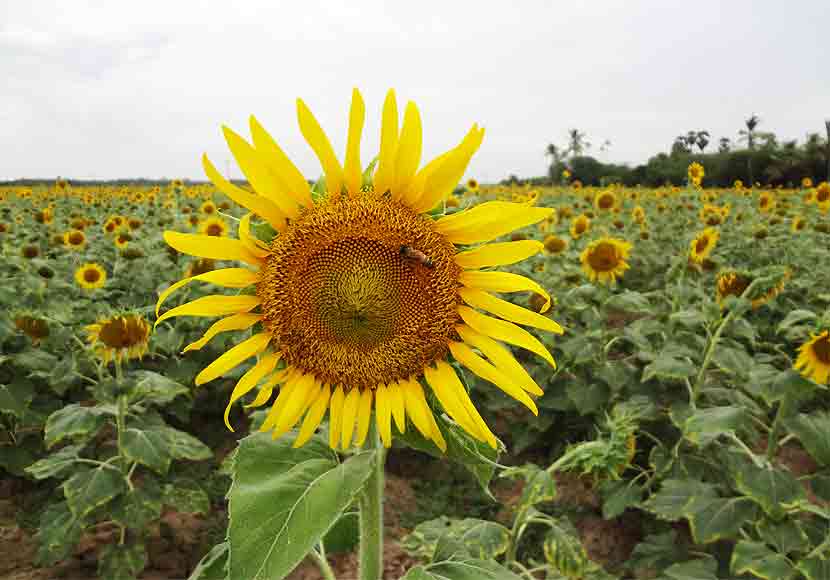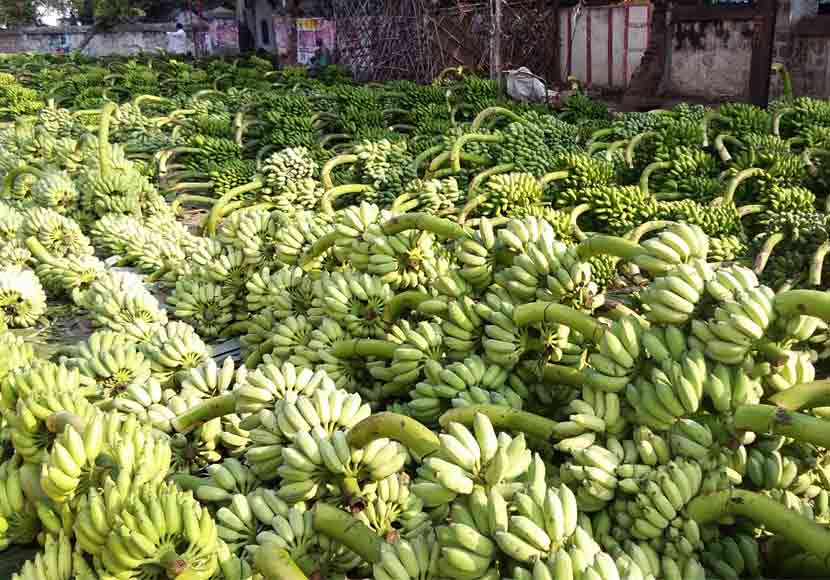
Agriculture is the most important occupation in Rural parts of Karur district. MyKarur has done a study on Agriculture, vanagam, and organic farming in Karur. Based on our study, we are providing you the below details
Karur Agriculture
The rural economy of the Karur district is mainly agrarian (Agriculture and farming-related activities).
Farm output not only meets the food requirements of the district but is also supplied to other parts of Tamil Nadu.
Agriculture provides sustenance to around 33% of the labor force in the district and forms the basis for a vast market of consumer goods and agro-based industries.
Vanagam Karur

Vanagam is a Non Government organization ( NGO ) which involves in organic farming, located in Karur in Tamil Nadu. Lots of youngsters and people interested in organic farming will surely visit Vanagam.
Vanagam guides the rain fed farmers, research were done on millets, pulses and other rain fed crops, proper training has been given to them, not only in production, but also in post production training like value addition also given to them
Heirloom Seed collection and sharing is done in Vanagam every year.
Bridging seed saver and farmers will share knowledge and seeds at vanagam events. Training on indigenous medicine practice is also done.
Other activities include Irrigation and water management research and sharing those data with farmers
Organic Farming

Thiru G.Nammalvar from Thanjore has sown the seed about the importance of Organic farming in the hearts of youngsters. He founded Vanagam an Ecological Foundation which helped to provide practical education on various fields about Farming.
Nammalvar’s birthday is celebrated as “Seed Day”. People who have are successful in various feeds of agriculture are awarded during the - Seed Day. This is done with the contribution received in Nammalvar award funds.
His aim was – ‘people should consume poison-free food’. Through “Seed Travel”, he collected and recovered more than fifty traditional seed varieties across India. Paddy, rare breed pulse, vegetable and green seeds are few of them.
He challenged Neem patent in Europe. Tamilnadu Organic Farmers Federation was alos founded by Nammalvar.
Vanagam address as follows
Vanagam,
Nammalvar Ecological Foundation,
Suruman Patti,
Kadavur,
Karur Pincode – 621311,
Tamil Nadu
Email: [email protected]
Phone : +91-9445879292
Website: https://vanagam.org/
Crops
The principal cereal crops of this district are Paddy, Cholam, and Cumbu. Among the pulses, the major crops raised are red gram, black gram, green gram and horse gram. Pulses are predominantly cultivated as rain-fed crops.
Oilseeds are grown throughout the district. Among the oilseeds groundnut, gingelly, and sunflower occupy an important places.

Groundnut cultivation is undertaken under irrigated as well as rain-fed areas. Sugarcane is the major commercial crop raised under irrigation.
Markets

The major markets for agriculture products produced in Karur are
- Gandhi Market, Trichy
- Periyar Vegetable Market Koyambedu, Chennai
- Oddanchathiram, Dindigul
- Natchipalayam vegetable market, Coimbatore
Seed Farm
The district has one State Seed Farm situated at Inungur in Kulithalai Taluk. The main objective of this farm is the production and distribution of quality seed
of Paddy and Millets.
There are 24 wholesale fertilizer retail shops and 232 Fertilizer dealer shops in the district. While 82 Primary Agriculture Credit Societies are also functioning to meet the fertilizer and pesticide needs of the farmers.
Horticulture
Moringa oleifera, Banana, Chilly are the two main horticultural crops in this district.
Farmers in and around Moolanur, Karur, Dharapuram areas of Tamil Nadu, predominantly cultivate perennial moringa which has a pod length of 45-50 cm, pod weight of 120 g and a yield of 200 kg/tree. Trees are maintained up to 15 years without pruning.
Moringa trees are also planted in gardens that can also provide support for climbing crops such as bitter gourd, snake gourd, ribbed gourd, greens and pole beans, although only mature trees should be used for this purpose since the vine growth can choke off the young tree.
Moringa trees can be planted in gardens to provide shade to vegetables less tolerant to direct sunlight
Crops such as maize, fodder sorghum, bajra, ragi, pulses, seasamum, groundnut etc. can be cultivated with casuarina and moringa under rainfed conditions
Irrigation
The Cauvery system channels are the main source of irrigation. The irrigation facilities are often found inadequate to raise crops throughout the year.
Because of inadequate storage and seasonal variations in the river flow, there are severe shortages of water during critical months.
Irrigation wells provide an unfailing supply of water and form an important source of irrigation in the district.
There are 47316 wells in the district during 2009-10, used exclusively for irrigation; 43067 pump sets were energized till March 2010 and 21725 huts were electrified in 2009.
As per the village records, the net area sown in Karur district in 2009-10 was 82597.5 hectares. Out of this, 47747.5 hectares were irrigated, which constitutes 57.81% of the Net sown area.
Karur cropping pattern
The cropping patterns of a region are closely influenced by geo-climatic, socio-economic, historical, and political factors.
Relating the crop density in each of the component areal units of the region to the corresponding density for the entire region makes it possible to measure the regional concentration of crops objectively and to differentiate areas that have some significance with regard to crop distribution within the region.
Karur Soil
The soils of Karur district in Tamil Nadu can be broadly classified into 4 major soil types.
- Red Soil,
- Thin Red Soil,
- Red Loam,
- River Alluvium Soil.
Red soil is the predominant one covering major part of the district followed by Thin Red soil and Red loam.
The red soil is predominantly seen in Kadavur taluk, Kulithalai, Krishnarayapuram taluk, Thanthoni and Thogamalai blocks.
The thin red soil is seen in Aravakurichi taluk and K.Paramathy blocks.
Major portion of the Karur block is covered by red loam.
Agriculture issues
A combination of factors such as increasing industrialization, urbanization, housing activities, and infrastructure development triggered the conversion of agricultural land into non-agricultural uses.
This has resulted in a decline in the area under cultivation. As the house for sale in Karur increases; the cultivation land decreases
The scope for expansion of the area available for cultivation is also very limited.
The pattern of land ownership imposes limitations on the models that can be adopted for agricultural development.
Karur Land Use Pattern
According to Agricultural Census, 2009-10 in Tamil Nadu, the marginal and smallholdings of less than 2 hectares accounted for 92.0 percent of the total holdings and 61.0 percent of the total operated area.
In Karur district, there are 1.21 lakh operational holdings, of which 0.84 lakh holdings are below one and one hectare; 0.21 lakh holdings are between one hectare to two hectares and 0.17 lakh holdings are above 2 hectares.
The total area of the district is 286154.7 hectares. (Rural-257804.7 hectares and Urban-28350 hectares)
Summary
Agriculture and farming are the major activity in rural parts of the Karur district. The agricultural products are sold in major vegetable markets in nearby districts.
Due to industrialization, housing construction, urbanization, and low income, the major rural population is moving out of agriculture.
Vanagam - The non-Government organization, was started to guide and help people interested in farming.
FAQ
Is Agriculture practiced in Karur district?
Yes. Agriculture and related activities are practiced in rural parts of Karur district.
Does farming output meet the Karur district requirements?
Yes. Farming output meets the Karur district requirements and excess produce are sold in other cities of Tamil nadu.
What are the Agriculture crops grown on Karur?
Cereal crops like Paddy, Cholam and Cumbu. In pulses red gram, black gram, green gram and horse gram are grown in Karur.
What are the oil seed crops grown in Karur?
Sunflower, groundnut, gingelly are the oil seed crops grown in Karur.
What are the horticultural crops grown in Karur district?
Moringa oleifera (Drumstick vegetable ), Banana, Chilly are the main horticultural crops in Karur.
What does Vanagam do?
Vanagam is a Non Government organization, which helps in guiding people who are interested in Organic farming.
Who is Thiru. Nammalvar?
Thiru. Nammalvar was a social activist. His only motive was ‘people should consume poison free food’.
Who founded Vanagam?
Thiru. Nammalvar started Vanagam - an Ecological Foundation which helped to provide practical education on various fields about Farming.
Where is Vanagam Located?
Vanagam is located at below address
Nammalvar Ecological Foundation,
Suruman Patti,
Kadavur – 621311
Karur (Dt),
Tamil Nadu
Phone: +91-9445879292
Website: Vanagam Karur
What is “Seed Day”?
6th April is celebrated as seed day in Tamil nadu. It is the Birth Day of Thiru. Nammalvar.
How is Seed day celebrated?
Seed day is celebrated at Vanagam, Karur. People who are successful in farming are awarded during the seed day.
In which markets, agricultural produce from Karur are sold?
Agricultural produce from Karur are sold in following markets
- Gandhi Market, Trichy
- Periyar Vegetable Market Koyambedu, Chennai
- Oddanchathiram, Dindigul
- Natchipalayam vegetable market, Coimbatore
What is the major source of Irrigation for Karur agriculture Farms?
Rivers Cauvery and Amaravathi are the major sources of irrigation in Karur.
Apart from above rivers, wells also an important source of irrigation.
What are the types of soils in Karur?
There are 4 types of soils in Karur. They are
- Red Soil
- Thin Red Soil
- Red Loam
- River Alluvium Soil